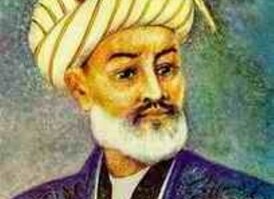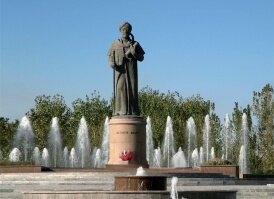About Alisher Navoi
 Alisher Navoi (1441 — 1501) is the greatest historical person whose life and literary activity covers the whole period of the history of our thought and literary culture. He is unequal and incomparable representative of our national literature, pride of our nation, and a man who demonstrated our glory and fame to the whole world. I would say that there is not a single person who, speaking good Persian and good Turkic languages wouldn’t recognize the personality of Alisher Navoiy, wouldn’t love him, wouldn’t worship him. If we recognize him as a Holy man, he is the holiest person among the holy people, if we accept his personality as a thinker, he is the leader of thinkers of his time, if we appreciate him as a poet he is the king of poets. In the history of world literature we can rarely meet such a great poet as Alisher Navoiy who could so deeply express the joys and sorrows of man, goodwill and the meaning of the life.
Alisher Navoi (1441 — 1501) is the greatest historical person whose life and literary activity covers the whole period of the history of our thought and literary culture. He is unequal and incomparable representative of our national literature, pride of our nation, and a man who demonstrated our glory and fame to the whole world. I would say that there is not a single person who, speaking good Persian and good Turkic languages wouldn’t recognize the personality of Alisher Navoiy, wouldn’t love him, wouldn’t worship him. If we recognize him as a Holy man, he is the holiest person among the holy people, if we accept his personality as a thinker, he is the leader of thinkers of his time, if we appreciate him as a poet he is the king of poets. In the history of world literature we can rarely meet such a great poet as Alisher Navoiy who could so deeply express the joys and sorrows of man, goodwill and the meaning of the life.
Alisher Navoi’s numerous writings, endowments, and his life example have had lasting influence. Today, in the modern country of Uzbekistan, he is revered above all other poets. The name of Alisher Navoi is visible throughout the country. Major streets, theatres, museums, parks, and even a province and city are named after him. His proverbs are on the tongues of Uzbeks, Turkmen and Tajiks. He is considered the father of the Uzbek language and one of the greatest poets of Central Asia.
 Navoi lived from 1441 to 1501 in Herat, Afghanistan. As a child, his skill for poetry was recognized and his father made sure he received the proper training. When his foster brother Hussien Baykara became the Emir, Navoi naturally became his prime minister. He was a wise statesman, who advised Baykara on many matters. Once when Baykara’s son’s rebelled as a prince of nearby Balkh, Navoi paid a personal visit to persuade him otherwise. Navoi was a good steward of his high position and helped establish many needed institutions. «Nawai (Navoi) is reputed to have founded, restored and endowed no fewer than 370 mosques, schools, libraries, hospitals and other pious and charitable institutions in Khurasan alone." (Devereux, Robert. Muslim World 54 1964, p 270 -287).
Navoi lived from 1441 to 1501 in Herat, Afghanistan. As a child, his skill for poetry was recognized and his father made sure he received the proper training. When his foster brother Hussien Baykara became the Emir, Navoi naturally became his prime minister. He was a wise statesman, who advised Baykara on many matters. Once when Baykara’s son’s rebelled as a prince of nearby Balkh, Navoi paid a personal visit to persuade him otherwise. Navoi was a good steward of his high position and helped establish many needed institutions. «Nawai (Navoi) is reputed to have founded, restored and endowed no fewer than 370 mosques, schools, libraries, hospitals and other pious and charitable institutions in Khurasan alone." (Devereux, Robert. Muslim World 54 1964, p 270 -287).
Navoi’s greatest contribution, however, comes in the realm of the arts. Under his guidance and patronage of art and culture Herat blossomed to one of its finest periods. Navoi himself wrote over 100,000 lines of poetry, including six epic poems. He wrote passionately for peace and acceptance and vehemently against oppression and violence. While he was still alive, his contemporaries considered him to be the best Eastern Turkish writer ever. This claim is still true today. «The impact of Nawai’s works on all Turkic peoples and languages cannot be overestimated. He exerted a profound influence not only on later Central Asian authors who wrote in Caghatay up till the beginning of the 20 th century, but also on the development of Azeri, Turkmen, Uyghur, Tatar and Ottoman Turkish literatures." (Subtelny, M. E. Islamic Encyclopedia.)

